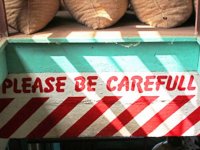Does Spelling Count?
Your content has been saved!
Go to My Saved Content."Does spelling count?"
This is one of my favorite and least favorite questions all rolled into one.
As a science teacher, I gave an assignment to my students to create a children's book. "In your book, I want you to explain everything your readers have learned about the different types of clouds and how they relate to weather patterns." Before I even have the chance to hand out a rubric, no less than five children call out, "Does spelling count?!?" I am sure they're hoping for a simple "yes" or "no" (and more specifically a "no"), but this seems to be a teachable moment if I have ever met one. I'm going to seize it . . .
Math by Any Other Name
What is the purpose of learning spelling? Grammar? Math? Why do we break these subjects down? Why do these subjects seem so parsed from our students' lives that they need to know if something "counts?"
I ask my students these very questions. Why do I care if you learn spelling? Most of the answers are pretty accurate -- we need it when we grow up, so we don't make silly mistakes, so people understand our writing. So then I ask their own question back to them: "So should spelling count?" Through some groans and sighs, we agree that it makes the most sense for spelling to count. But those groans and sighs tell me something that is so endemic in our society. These children have been taught from a very young age that their "grades" matter more than the actual purpose of the assignment -- just like "subjects" trump true learning.
My six-year-old came home from his first day of first grade and declared to his little brother, "When you get into first grade, you are going to love math and science!" This declaration from my older son is accurate. My younger one will most likely enjoy math and science when he reaches first grade. How do we know this? Because he loves math and science in nursery school -- it's just that no one calls it "math" or "science." In nursery school, math is called cooking, building or drawing. Science is called gardening, exploring or playing on the yard (finding bugs and figuring out what they do is a specialty). What happened between nursery school and first grade that made us forget this? Why is it so critical for a first grader to learn "math" as a stand-alone subject? What happened to building?
Changing the Subject
I understand the need we have for teaching children isolated skills in order to enhance their deeper understanding of a subject. It makes sense that we're teaching them the concept of addition in order for them to successfully apply this concept to their building techniques. We do need to teach children spelling patterns because that will allow them to communicate in a more sophisticated and comprehensive manner as they advance in their writing. But how did these skills become the be-all and end-all of education? How did "math" become a stand-alone subject that has to be taught between 9:15 and 10:00 five days a week?
What if we were to eliminate subjects? What if we said there was no more "spelling" or "writing" or "math," and we just had "school"? In school, we want to advance the capacity for learning and knowledge of our students. There is no need to get stuck in the constraints of subjects and all the baggage this entails. What would my "science" classroom have looked like if this had been the culture of the school?
"We are going to write books about clouds for the kindergarteners to read. We are going to have to learn and practice all of the skills to do this effectively."
There is no more room for the question, "Does spelling count?" Of course spelling counts -- as much as accurate facts about clouds, weather patterns, and of course neatness also count. How is a kindergartner going to understand and learn from your book if it isn't legible, or comprehendible, or accurate?
I am not the only one who thinks this way. We can call this method problem-based learning, project-based learning or many other variations on the concept. Whatever you do, please, just don't call it "science."
What would happen if you were to eliminate subjects in your classroom?
